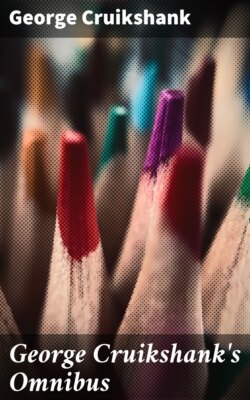Читать книгу George Cruikshank's Omnibus - George Cruikshank - Страница 18
На сайте Литреса книга снята с продажи.
Оглавление"Hereditary bondsmen, know ye not
He wants that greatest art, the art to blot!"
If we might dare to parody (Scott said it was a sin to parody—"We are seven") any one line sanctified by the genius of a Plagiary, we should say that too many of his descendants want that greatest art, the art to steal. They steal—but not with integrity. There may be, nay there is, such a thing as honest theft—equitable robbery—prigging with justice and honour. We hold that in all cases of literary borrowing, or robbery (for it comes to the same thing), it is ten million times better to rob or borrow without the least disguise, equivocation, or mutilation whatsoever. Take the line as you find it. Don't crack it as you would a nut, picking out the idea, appropriating it to your own purpose, and leaving only the husk behind. You will never get an artificial shell to grow round it; it will never be the nut it was before. Take it whole. Prudery in these cases is often worse than folly—it is shabbiness. It is folly, when, after stealing a fine symmetrical thought, a whole morning is spent in disguising, distorting, and deforming it, until at last all that remains of it merge into the unprofitable moral—"of no use to anybody but the owner." It is shabbiness, when, as is the practice of prose-writers, a splendid passage is purloined, and a bargain is struck with conscience; when, just for decency's sake, six words of the sentence are publicly attributed by inverted commas to the right owner, while all the rest assumes the character of originality. We may give an example in the following passage from Burke's Reflections on the Revolution in France, which we will suppose to be thus printed:—
But the "age of chivalry" is gone; that of sophisters, economists, and calculators has succeeded; and the "glory of Europe" is extinguished for ever. The unbought grace of life, the "cheap defence of nations[3]," the nurse of manly sentiment and heroic enterprise, "is gone!"
This cunning practice of acknowledging a few words borrowed, with a view to divert suspicion from the many you have stolen, is like confessing a lawful debt of sixpence, due to the man which you have just plundered of fifty pounds; and this practice, Sir Fretful Plagiary, to his immortal honour, scorned to adopt. Could his original and abundant genius have stooped to steal, he would have stolen conscientiously; he would have taken the whole passage outright; instead of spoiling everything he laid his hands upon, and making (as Dryden says) "the fine woman end in a fish's tail." War is honourable, manslaying is not; pillage is legalised by custom, which cannot be said of picking pockets. Thus, as it is more honourable to pillage than to pilfer, so is it to seize upon a whole line, or even a couplet, than to extract the essence of it surreptitiously, or sneak off with a valuable epithet; and it is the more honest, because every author has a better chance, after the robbery has served its purpose, of getting back his own.
Had this principle been in operation from the beginning, what confusion it would have prevented! what discords between authors! what perplexities in settling their claims to disputed metaphors, and their rights in contested ideas! From the mere want of this common honesty in purloining, it is impossible, in many instances, to come to an equitable adjustment. It is a wise poet that knows his own conceit—or to prevent mistakes, let us say, his own idea. He sees his private property transferred to the pages of another, and cannot swear to it. There is no saying which is yours and which is his. Tuum rhymes to suum, and always will.
